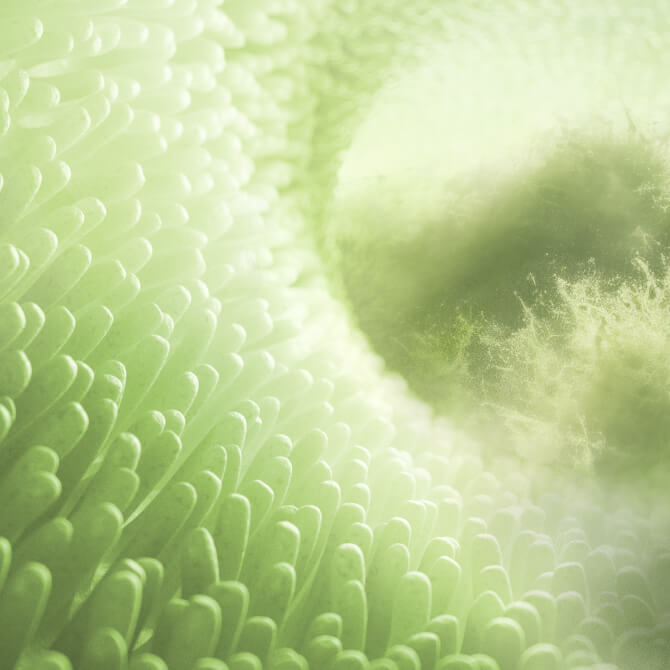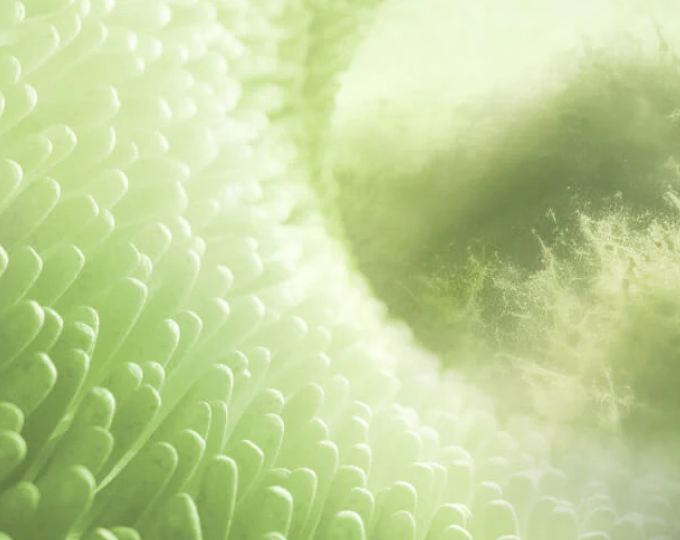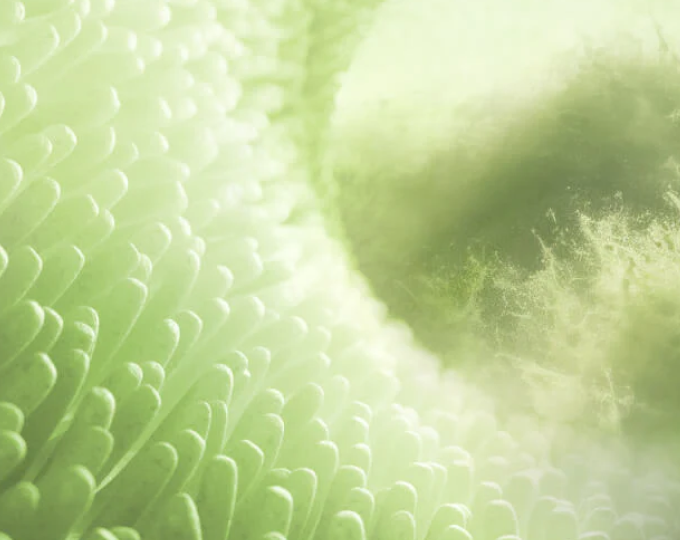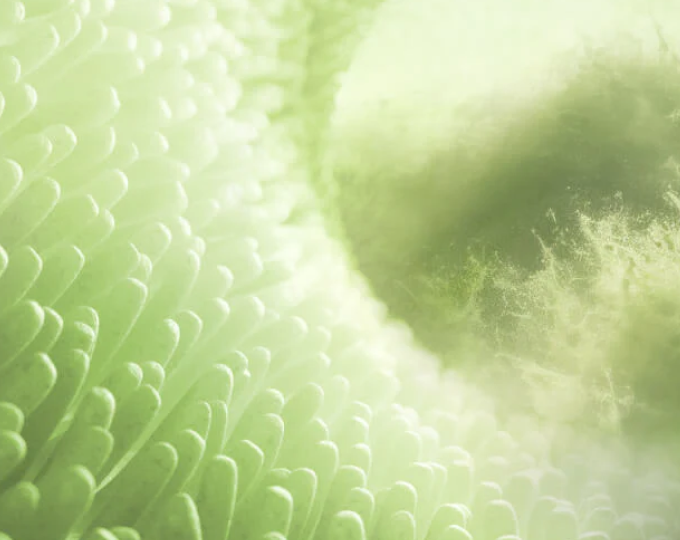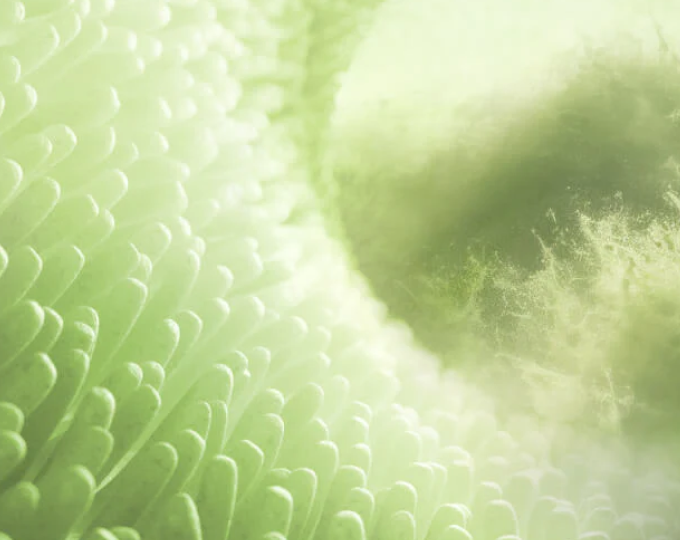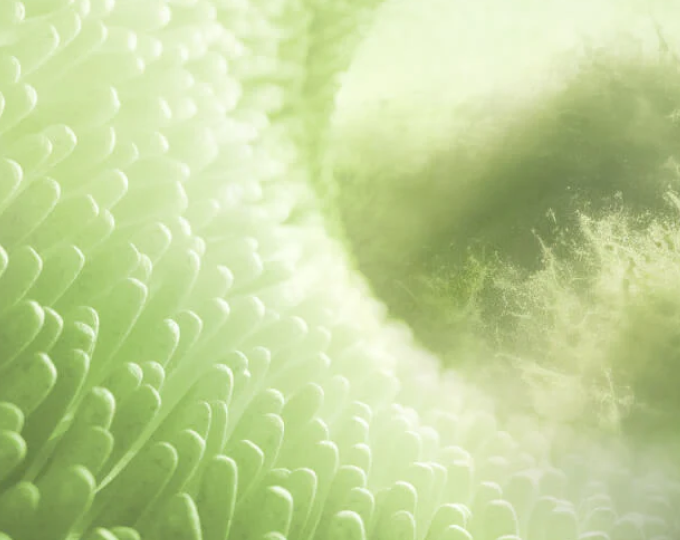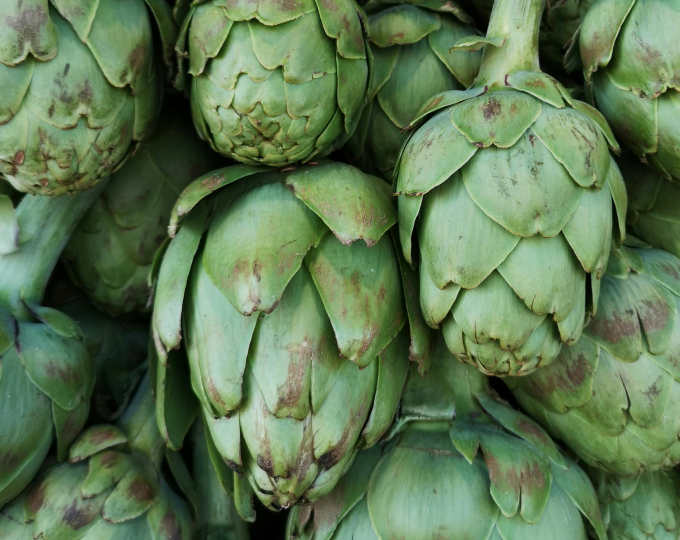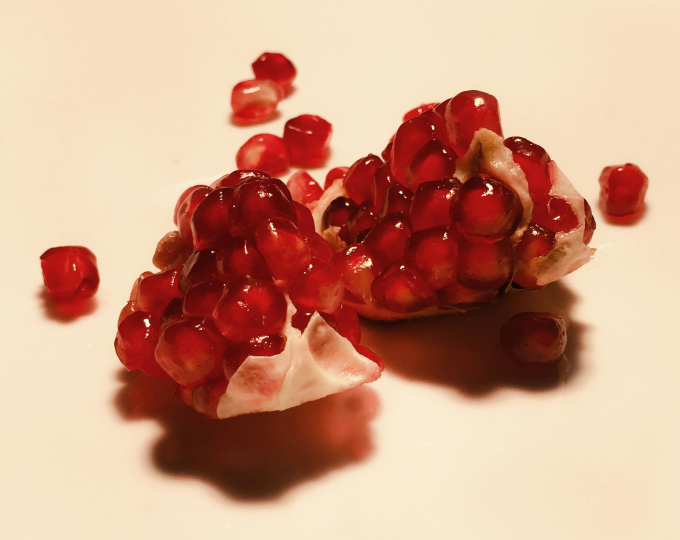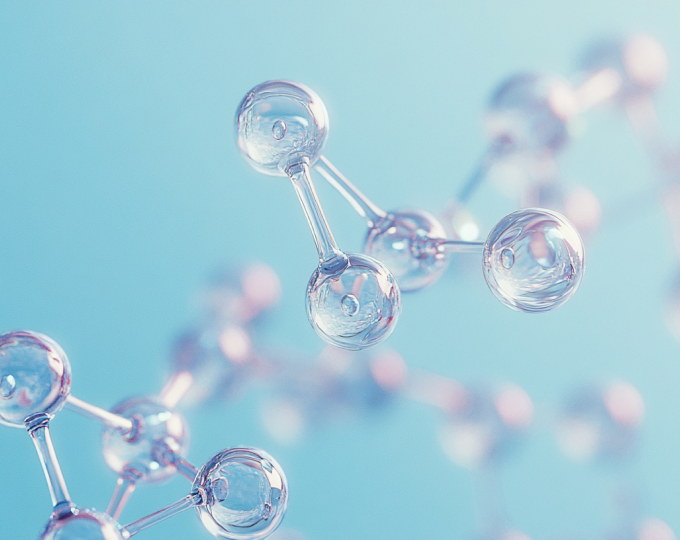Themen dieses Blogartikels:
Table of contents
- The intestine: your ally for greater well-being
- What is the gut microbiome?
- Intestinal flora, intestinal microbiota & intestinal microbiome: What is the difference?
- 5 positive effects of the gut microbiome on your body functions
- 1. Optimization of digestion and nutrient absorption
- How are healthy intestinal flora and intolerances related?
- 2. Strengthening the immune system
- 3. Protection against harmful pathogens
- 4. Influence on metabolism, weight management & energy levels
- 5. Support for your gut-brain axis
- That is why a healthy intestinal flora is so important
- What destroys the microbiome?
- Gut microbiome through the ages
- Symptoms and effects of a disturbed microbiome
- 3 tips for a stable intestinal microbiome
- 1. Probiotics: Fermented foods as daily vital companions
- 2. Prebiotics: Food for good bacteria
- 3. Polyphenols and bitter substances: support for your digestion
- Conclusion: Use synergies from diet, exercise and nutrients to build up intestinal flora
- Sources & Bibliography
The intestine: your ally for greater well-being
For some, the intestine is merely a tube up to eight meters long that regulates digestion. However, for many doctors and experts, it's considered the "second brain." This organ in the center of the body consists of numerous nerves. Important hormones are also produced there, and without the intestine, your body wouldn't be able to absorb nutrients from food. The intestinal microbiome plays an important role in many of the tasks the intestine must perform every day.
What is the gut microbiome?
Every human carries a large number of different species of bacteria, fungi, and viruses. The totality of all microorganisms that colonize a living being is called the microbiome . They live together in microbial communities and can be found not only on and in the human body, but also in animals and other living beings.
The largest community of microorganisms is the gut microbiome, which encompasses all microorganisms in the digestive tract . Billions of microbes thrive there, whose mission is to maintain many vital functions. The large intestine, in particular, is an important habitat for microorganisms and hosts a large bacterial community.
Intestinal flora, intestinal microbiota & intestinal microbiome: What is the difference?
When discussing the ecosystem of microorganisms in the gut, the term "gut flora" is sometimes used. This is because microorganisms like bacteria were once considered part of the plant world, i.e., flora. However, bacteria are now considered a separate group of organisms, which is why they are now more commonly referred to as the gut microbiome.
There is also the term intestinal microbiota. Microbiota and microbiome are often used synonymously. However, there is a subtle difference between the two: While microbiota refers to microorganisms such as fungi and bacteria, the microbiome encompasses the entirety of all microorganisms, including the microbes' genetic material and metabolic products. The microbiota is therefore considered part of the microbiome.
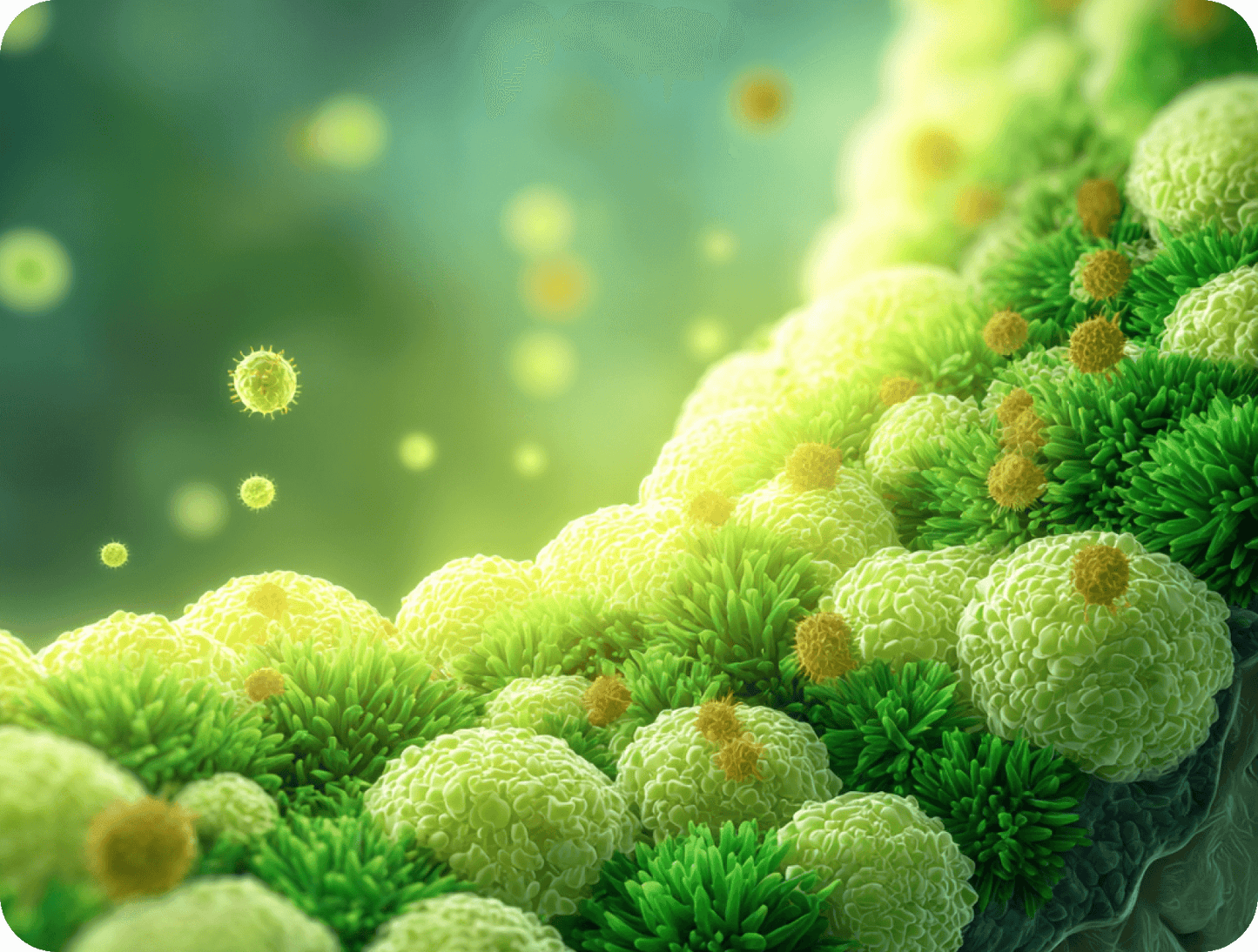

5 positive effects of the gut microbiome on your body functions
How does the gut microbiome specifically affect your body? Below, we'll introduce you to five important functions performed by your gut microbiome.
1. Optimization of digestion and nutrient absorption
The gut microbiome ensures that your body can optimally break down food into its components and absorb it. The tiny "helpers" that make up the gut microbiome digest complex carbohydrates and fiber. This process produces valuable short-chain fatty acids like butyrate, which protect your intestinal cells and contribute to proper digestion.¹
A balanced gut microbiome has immediate positive effects on your well-being : You feel energized, vital, and free from digestive problems such as bloating and discomfort. A microbial imbalance, on the other hand, can lead to numerous digestive problems and have a lasting impact on your quality of life.²
How are healthy intestinal flora and intolerances related?
A functioning and diverse microbiome acts like a protective shield. It better keeps histamine and gluten, for example, in check. However, if the balance in the gut is disrupted, the likelihood of intolerances increases.
- In people with histamine intolerance, for example, research shows that the intestinal flora is often imbalanced. This means that protective bacteria in the gut are lacking, while problematic germs increase. Furthermore, the intestinal wall is often more permeable. Both of these factors allow more histamine to enter the body, leading to typical symptoms such as headaches, skin redness, or abdominal problems.³
- The microbiome also plays a role in gluten intolerance . In celiac disease, for example, "good" bacteria are rarer, while pro-inflammatory species are more common. In gluten sensitivity, the diversity of the intestinal flora is often also limited. These changes can make gluten harder to digest, more easily penetrate the immune system, and lead to typical symptoms such as bloating, abdominal pain, or fatigue.⁴
2. Strengthening the immune system
Immunologists estimate that over 70% of the immune system is located in the gut. There is evidence that a balanced gut flora has a preventative effect on the risk of infections, inflammation, and allergic reactions.⁵ When the gut microbiome is balanced, the immune system is intact, and you are less susceptible to colds, allergies, and other immune-related diseases.
Tip: To strengthen your immune system, you need to know what weakens it. Learn more in our blog article on the causes of a weak immune system.
3. Protection against harmful pathogens
The gut microbiome is an important part of your body's defense system . It creates a protective barrier by promoting "good" gut bacteria and fending off "bad" invaders. Thus, it supports the intestinal mucosa as a natural barrier against infections. These helpful microbes even produce antimicrobial substances that ward off harmful bacteria before they can cause harm.⁶ The microbiome can therefore also be considered an internal "protective shield."
However, if the intestinal barrier is weakened, this can promote, among other things, silent inflammation. Especially after antibiotic treatment , it is necessary to strengthen the intestinal microbiome to prevent potential new infections and diseases.
4. Influence on metabolism, weight management and energy levels
Do you feel like you're having trouble losing weight despite exercising and eating a healthy diet? It's not just calorie consumption that plays a role; your gut microbiome can also be crucial. Researchers have discovered that certain types of bacteria in the gut influence how many calories we actually absorb from food. Some microbes are specialized in extracting energy particularly efficiently from fiber or sugar. If these types predominate, your body may be "extracting" more calories than is actually good for you.
A balanced microbiome, on the other hand, functions like a natural regulator: It supports metabolism , helps reduce excess fat, improves insulin sensitivity, and contributes to a healthy body weight.⁷
Advertisement
- Daily routine for the gut and immune system
- Flora Balance with 27 probiotic bacterial strains
- Flora Stabil with 30g fiber & 14 plant substances, for the intestinal flora and the microbiome
- Phytobiose Total with 11 other valuable plant substances for the immune system
- Developed with doctors & experts
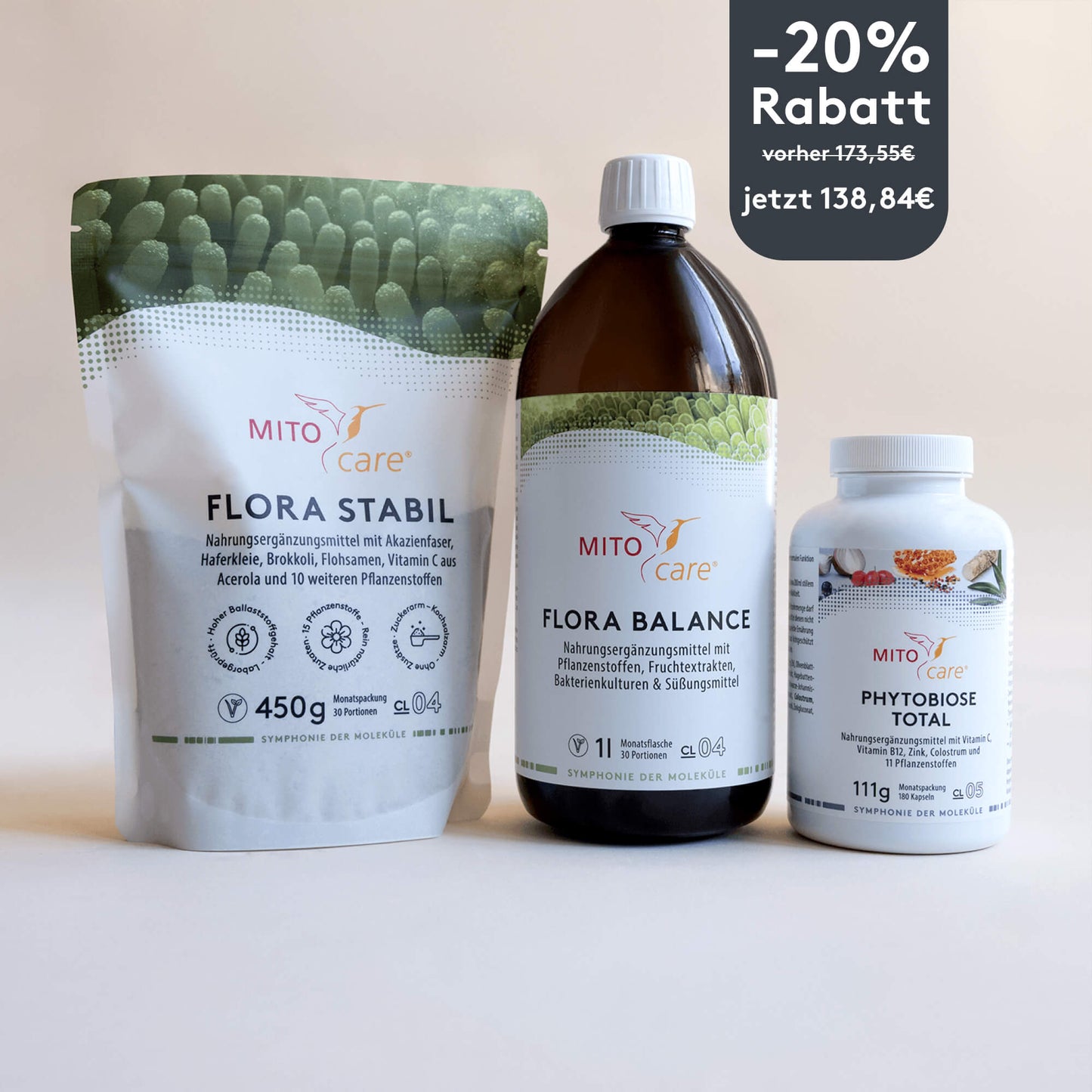
5. Support for your gut-brain axis
The gut is more than just a digestive organ: It communicates closely with your brain. This means that the microbiome can influence mood, stress levels, and even mental health via the so-called gut-brain axis .
The beneficial bacteria in the gut produce neurotransmitters. 90% of the happiness hormone serotonin is produced in the gut.⁸ A balanced gut can therefore boost mood, reduce stress, and reduce anxiety.
In addition, there's the gut-skin axis : Just like the gut, the skin also hosts a community of microorganisms. Both communities communicate with each other and ensure that you feel comfortable in your skin. Therefore, disturbances in the gut can also negatively impact the skin microbiome.⁹
That is why a healthy intestinal flora is so important
The gut microbiome is more than just a random collection of bacteria in the gut—it influences everything from digestion to your immune system to your mood. Conversely, an imbalance - called dysbiosis - can be the root cause of many health problems.
Intestinal bacteria and their diversity and composition are therefore an important factor for your well-being and deserve your attention. Before we delve into tips for strengthening your intestinal flora, let's look at what you can better protect your microbiome from.
What destroys the microbiome?
- Medications like antibiotics kill not only pathogenic bacteria, but also many beneficial ones. Other medications like painkillers can also disrupt the balance.
- An unhealthy diet high in sugar, white flour, and highly processed foods promotes "bad" bacteria that cause inflammation. On the other hand, a lack of fiber deprives the "good" gut bacteria of food.
- Alcohol consumption and smoking irritate the intestinal mucosa and reduce bacterial diversity. Smoking can also alter the composition of the microbiome.
- Chronic stress not only affects your stomach, but also your gut. Long-term stress releases stress hormones that make your gut more permeable ("leaky gut") and disrupt the balance of bacteria.
- Lack of sleep or irregular sleep can disrupt your gut clock, because your microbiome follows a daily rhythm like your internal clock.
- Environmental factors that could disrupt your gut microbiome include excessive hygiene or a lack of contact with nature and animals. Both can limit the diversity of your gut flora. Pesticides, environmental toxins, or heavy metals can also damage the bacteria.
Intestinal microbiome through the ages
Diversity is key when it comes to the microbiome. However, researchers have found that our modern lifestyle has significantly altered the intestinal flora over time, and not in the best interests of our health.
People in highly industrialized countries have a microbiome that never existed in this form before. The factors mentioned above, among others, contribute to this. Microbes that were once beneficial in the gut and, for example, protected the mucous membranes, are now rarer. However, those that even attack the mucous membranes are increasing.¹⁰
These changes in the microbiome, like the decline in animal biodiversity, cannot be easily reversed. Therefore, it is all the more important to pay attention to your microbiome and strengthen it as much as possible in your daily life.
Symptoms and effects of a disturbed microbiome
If the microbiome becomes unbalanced, it can lead to a variety of health problems:
- Due to modern-day challenges such as persistent stress, an unbalanced diet, or medication use, especially antibiotics, a large portion of the population suffers from digestive problems at least once in their lives. These can manifest as diarrhea, persistent pain, or constipation.
- Irritable bowel syndrome (IBS) is one of the most common functional bowel disorders and affects several million people worldwide to varying degrees.¹¹ Evidence from scientific studies suggests that an imbalance in the intestinal microbiome (dysbiosis) can be associated with typical symptoms such as bloating, abdominal pain, and digestive discomfort.¹² Initial clinical studies show that fecal microbiota transplantation (FMT) can potentially lead to an improvement in symptoms in some affected individuals.¹³
Advertisement
- Daily routine for the gut and immune system
- Flora Balance with 27 probiotic bacterial strains
- Flora Stabil with 30g fiber & 14 plant substances, for the intestinal flora and the microbiome
- Phytobiose Total with 11 other valuable plant substances for the immune system
- Developed with doctors & experts

3 tips for a stable intestinal microbiome
To ensure your gut bacteria feel completely healthy and your immune system can fulfill its functions and protect you from disease, your gut needs support. If you want to give it the full benefits of wellness, you can consider intestinal cleansing . You can find out everything you need to know about it in our blog.
Often, however, even small lifestyle changes are enough, such as a little more exercise, a little less stress, and a more mindful diet rich in vegetables and fiber. All of this can help restore intestinal balance and significantly improve quality of life.¹²
The following three tips show how you can build your gut microbiome through diet and with the support of probiotics and prebiotics as well as plant and bitter substances.
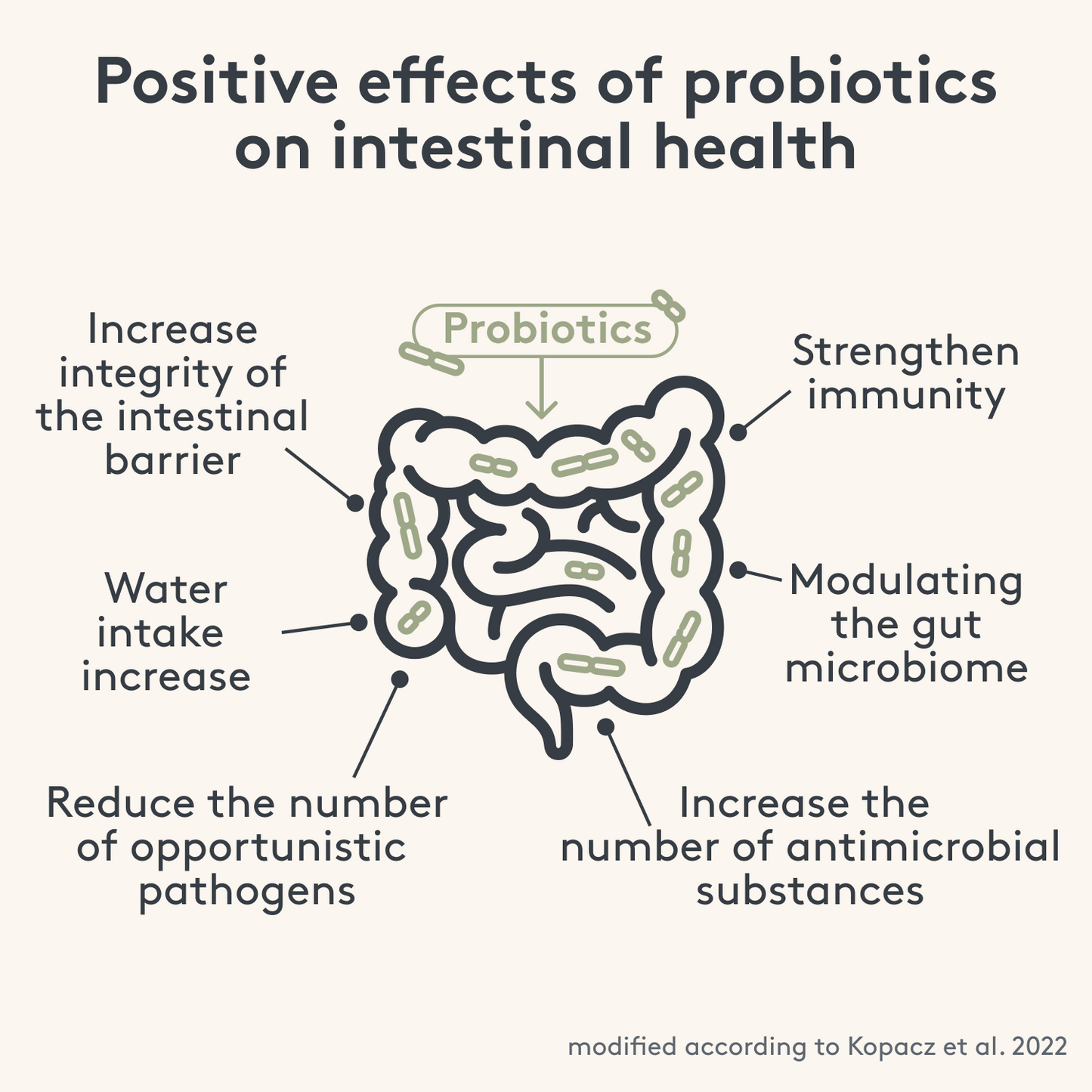

1. Probiotics: Fermented foods as daily vital companions
Probiotics are live microorganisms that help your gut maintain a healthy environment. Fermented foods, in particular, contain these "good" bacteria, for example
- yogurt
- sauerkraut
- Kimchi
- kefir
Probiotics are also available in supplement form. Regardless of how you take them, probiotics ensure optimal gut function, the intestinal barrier functions as it should, and support the natural balance of the gut microbiome.
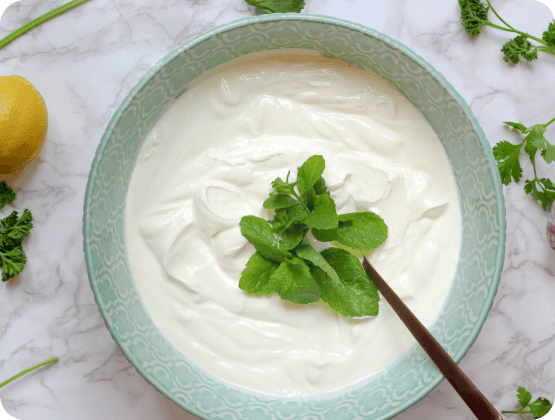

2. Prebiotics: Food for good bacteria
In addition to probiotics, there are prebiotics. These are indigestible fibers that serve as food for the beneficial intestinal bacteria. They promote bacterial growth and help strengthen the microbiome.
With a diet rich in prebiotics, you ensure that the good bacteria thrive and can optimally fulfill their protective functions.¹⁴ Foods such as
- asparagus
- Bananas
- Whole grain products


3. Polyphenols and bitter substances: support for your digestion
Polyphenols such as oligomeric proanthocyanidins (OPC), for example from grape seed extract , have anti-inflammatory properties and can therefore promote microbiome health. Initial study data indicate that grape seed extract may have a positive effect on the diversity of the human microbiota.¹⁵ OPC is found in the seeds and skins of some foods, such as apples and blueberries.
Also bitter substances , which come from herbs, for example, can have a positive effect on digestion : By promoting the production of digestive juices, these substances can increase intestinal activity.¹⁶ They also support the function of the liver and gallbladder, thereby improving fat digestion.¹⁷
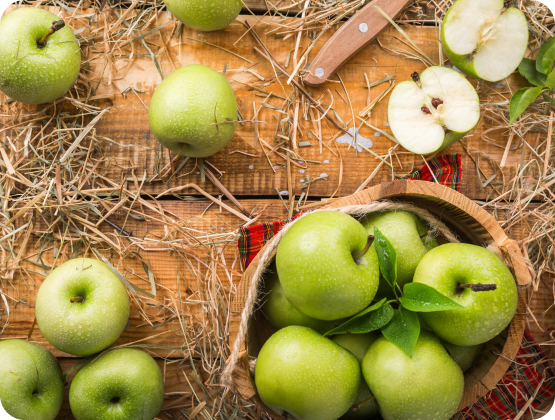

Advertisement
- 1 billion active bacteria & 16 microorganism cultures in a stable environment
- Over 10 bitter herbs & plant substances
- With premium ingredients such as artichoke, gentian root, and wormwood
- For fat digestion & less bloating
- 100% organic quality, certified according to EU organic standard
- Regularly tested for quality & purity
- Multi-stage fermentation, unsterilized, no additives
- Vegan, vegetarian, gluten-free & lactose-free

Conclusion: Use synergies from diet, exercise and nutrients to build up intestinal flora
To optimally support your gut and gut microbiome, you should take a holistic approach that goes beyond dietary changes. Adequate exercise strengthens your microbiome and your mind. In addition to a balanced diet, consuming well-balanced functional nutrient compounds can strengthen your gut flora.
To help you find the right treatment for you, alternative practitioners, doctors, or therapists are the right people to consult. They can conduct a microbiome test with you and then advise you on the current state of your gut microbiome and which nutrients, in which form, are best for strengthening it.
This article is based on carefully researched sources:
Sources & Bibliography
- Louis, P., & Flint, H. J. (2017). Formation of propionate and butyrate by the human colonic microbiota. Environmental microbiology , 19 (1), 29–41.
- Weiss, GA, & Hennet, T. (2017). Mechanisms and consequences of intestinal dysbiosis. Cellular and molecular life sciences: CMLS, 74(16), 2959–2977.
- Schink, M., Konturek, PC, Tietz, E., Dieterich, W., Pinzer, TC, Wirtz, S., Neurath, MF, & Zopf, Y. (2018). Microbial patterns in patients with histamine intolerance. Journal of physiology and pharmacology: an official journal of the Polish Physiological Society, 69(4).
- Catassi, G., Lener, E., Grattagliano, MM, Motuz, S., Zavarella, MA, Bibbò, S., Cammarota, G., Gasbarrini, A., Ianiro, G., & Catassi, C. (2024). The role of microbiome in the development of gluten-related disorders. Best practice & research. Clinical gastroenterology, 72, 101951.
- Shi, J., Wang, Y., Cheng, L., Wang, J., & Raghavan, V. (2024). Gut microbiome modulation by probiotics, prebiotics, synbiotics and postbiotics: a novel strategy in food allergy prevention and treatment. Critical reviews in food science and nutrition , 64 (17), 5984–6000.
- Kopacz, K., & Phadtare, S. (2022). Probiotics for the Prevention of Antibiotic-Associated Diarrhea. Healthcare (Basel, Switzerland) , 10 (8), 1450.
- Van Hul, M., & Cani, P.D. (2023). The gut microbiota in obesity and weight management: microbes as friends or foe?. Nature reviews. Endocrinology, 19(5), 258-271.
- Strandwitz P. (2018). Neurotransmitter modulation by the gut microbiota. Brain research , 1693 (Pt B), 128–133.
- Salem, I., Ramser, A., Isham, N., & Ghannoum, M.A. (2018). The Gut Microbiome as a Major Regulator of the Gut-Skin Axis. Frontiers in microbiology, 9, 1459.
- Sonnenburg, JL, & Sonnenburg, ED (2019). Vulnerability of the industrialized microbiota. Science (New York, NY), 366(6464), eaaw9255.
- Ford, AC, Sperber, AD, Corsetti, M., & Camilleri, M. (2020). Irritable bowel syndrome. Lancet (London, England) , 396 (10263), 1675–1688.
- Chlebicz-Wójcik, A., & Śliżewska, K. (2021). Probiotics, Prebiotics, and Synbiotics in the Irritable Bowel Syndrome Treatment: A Review. Biomolecules , 11 (8), 1154.
- Boicean, A., Birlutiu, V., Ichim, C., Anderco, P., & Birsan, S. (2023). Fecal microbiota transplantation in inflammatory bowel disease. Biomedicines , 11 (4), 1016.
- Carlson, JL, Erickson, JM, Lloyd, BB, & Slavin, JL (2018). Health Effects and Sources of Prebiotic Dietary Fiber. Current developments in nutrition , 2 (3), nzy005.
- Yang, J., Kurnia, P., Henning, SM, Lee, R., Huang, J., Garcia, MC, Surampudi, V., Heber, D., & Li, Z. (2021). Effect of Standardized Grape Powder Consumption on the Gut Microbiome of Healthy Subjects: A Pilot Study. Nutrients , 13 (11), 3965.
- Überall, F. (2017). Bitter substances for a healthy gut. Empirical Medicine 2017; 66(03): 177-181.
- Höhl, K., Lichtenstein, S. (2020). Bitter substances and components in foods and medicinal plants. Nutrition Review 8/2020, M472-M479.
